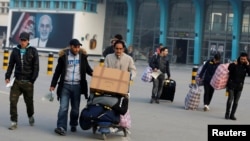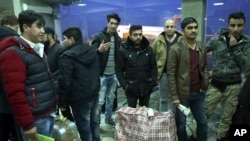More than 30 Afghans returned home Thursday after their applications for asylum were rejected by Germany.
The young men are the first of an estimated 12,000 Afghans the German government plans to forcibly send back to Afghanistan under a bilateral agreement.
German officials say the migrants have been issued deportation orders and another flight is expected to return more Afghan asylum seekers early next month.
The Afghan migrants who arrived at Kabul airport aboard a chartered plane were carrying few belongings.
They expressed disappointment over their eviction after living in Germany for years. They returned to Afghanistan where security has deteriorated since December 2014 when most international forces withdrew from the country, encouraging the Taliban to step up attacks and seize territory.
One returnee, Ali Madad Nasir, said he had been living in Germany for three years. He said that four German police officers entered his home early in the morning while he was asleep and arrested him.
"I didn't have a chance to take my clothes, cell phone and laptop - all left behind,” Nasiri told the Reuters news agency.
Thousands of Afghans joined asylum seekers from conflict-hit Middle Eastern countries and elsewhere entering Europe since 2015. Officials in Germany say Afghans were the second biggest group of asylum seekers in Germany in 2016, after Syrians.
Earlier this week, around two dozen Afghans also returned home from Norway and Sweden after they were denied asylum.
The Afghan government, which is struggling to develop the national economy, has vowed to help returnees resettle, though critics are skeptical about the pledges, citing corruption and internal political rivalries.
Protests
The agreement between Afghanistan and Germany has also sparked street demonstrations, with protesters complaining much of Afghanistan is still not safe and returnees could face reprisals.
"Everyone loves his country. I also love my country, but what should I do here?" said Mati Ullah, 22, who was part of the group of deportees who arrived on Thursday.
”Do I have to go and join the Taliban or Daesh?" he asked. Daesh is the Arabic acronym for the Islamic State terrorist group.
The U.S. military estimates that the Taliban control or contest one third of Afghan territory. Islamic State militants also have stepped up their efforts to extend their influence in the country.
“The national mood in Afghanistan is at a record low, and Afghans are pessimistic because of insecurity, corruption, and rising unemployment and slow job growth,” according to the annual survey by the San Francisco-based Asia Foundation released earlier this month.
The United Nations says that more than 1.1 million Afghans were already on the move in Afghanistan in 2016.
A U.N. spokeswoman, Danielle Moylan, told VOA the population includes 525,000 people internally displaced by the conflict this year and 613,000 Afghan refugees who have returned home from neighboring Pakistan.
“The numbers are far beyond what U.N. agencies anticipated this year, particularly concerning the returns from Pakistan, and as such, the humanitarian community collectively is under significant pressure to ensure the most vulnerable families are assisted, particularly before the cold winter season begins,” she said.





